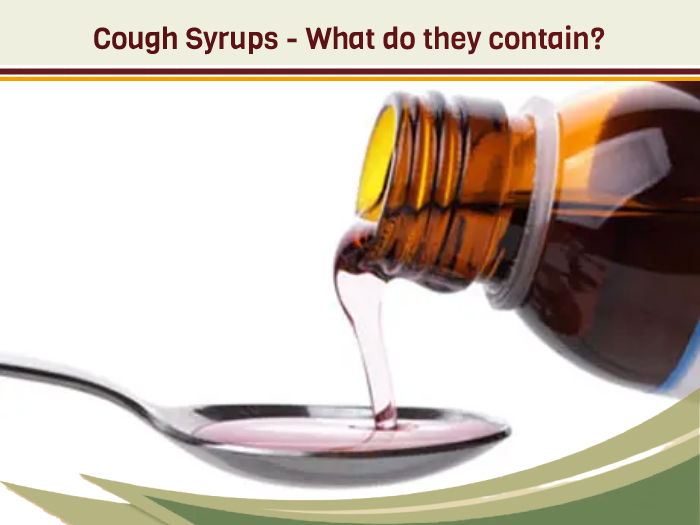Cough Syrups - What do they contain?
 Cough is a very common symptom and most of us buy an Over Counter (OTC) cough syrup for relief. However, there is no universal cough syrup that you can use – they are many different types, meant for different types of cough. Some have ingredients that are potentially harmful to the vulnerable population, especially children, the elderly, diabetics, and those with other underlying diseases including heart disease, prostate problems, hypertension, tachycardia etc.
Cough is a very common symptom and most of us buy an Over Counter (OTC) cough syrup for relief. However, there is no universal cough syrup that you can use – they are many different types, meant for different types of cough. Some have ingredients that are potentially harmful to the vulnerable population, especially children, the elderly, diabetics, and those with other underlying diseases including heart disease, prostate problems, hypertension, tachycardia etc.
What do Cough Syrups commonly contain and what are the types of cough syrup?
Most cough syrups are readily available in this country as OTC (over the counter) medication and may not require a prescription, which is a shame really, because there is no single ‘cough syrup’ and many of them have potentially harmful ingredients which should not be taken by some- specially small children and the elderly. They are of many kinds depending upon the reason for your cough. First of all it must be understood that ‘Cough’ is a protective human reflex and it performs the important and sometimes lifesaving function of expelling retained secretions, infected material and occasionally a foreign body from the Respiratory Tract. Cough syrups are largely of two types-
- Anti Allergic Cough suppressants- they prevent excessive cough. They can be of two types
- Centrally acting cough suppressants- like Dextromethorphan or Codeine
- Peripherally acting cough syrups – like Levodropropizine (though it may have a dual mode of action).
- Cough expectorants – These help to bring out secretions from the lungs etc.
CONSTITUENTS OF COUGH SUPPRESSANTS
- DEXTROMETHORPHAN- This is the most common universally used cough suppressant. It comes in various dosages ranging from 5 to 30 mg per 5 ml
- CODEINE- One of the strongest cough suppressants, acting centrally; it is a morphine extract. It can cause extreme drowsiness and constipation if used over a prolonged period. It is Not an OTC medication and needs a prescription. Since it is a centrally acting sedative it should not be used by patients with serious lung problems or those whose lung functioning is impaired.
- CHLORPHENIRAMINE- This is an anti histamine/anti cold medication and is given when a cold and cough co exist. It can make you drowsy and is not recommended if you have to drive through the day or handle complicated machinery.
- PHENYLEPHRINE- This is a decongestant and helps in drying up secretions. This is also used in the presence of a cold, specially if you have a runny nose or a post nasal drip.
CONSTITUENTS OF AN EXPECTORANT SYRUP
- AMBROXOL – One of the commonest ingredients in an expectorant syrup
- GUAIPHENESIN – another mucolytic
Expectorant cough syrups usually contain a Mucolytic which helps to break down mucin or secretions, making them less sticky- these can then be easily cleared by the body’s ciliary mechanism.
OTHER INGREDIENTS
- BRONCHODILATORS – Specially in children who are asthmatic.
- ACEBROPHYLLINE – as a mucolytic and bronchodilator
POINTS TO NOTE
- Diabetics must be careful while taking cough syrups since they have a high sugar content. Sugar free syrups are available in the market
- Patients with Prostrate problems, high blood pressure etc must not take decongestant syrups
- Children below 6 years should not be given Dextromethorphan
- Prolonged cough must be investigated- consult you doctor, have it investigated – do not ignore.

